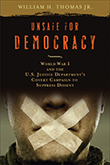|
American Surveillance
Intelligence, Privacy, and the Fourth Amendment
Anthony Gregory
From George Washington’s spies to the NSA
To defend its citizens from harm, must the government have unfettered access to all information? Or, must personal privacy be defended at all costs from the encroachment of a surveillance state? And, doesn’t the Constitution already protect us from such intrusions? When the topic of discussion is intelligence-gathering, privacy, or Fourth Amendment protections against unreasonable search and seizure, the result is usually more heat than light.
Anthony Gregory challenges such simplifications, offering a nuanced history and analysis of these difficult issues. He highlights the complexity of the relationship between the gathering of intelligence for national security and countervailing efforts to safeguard individual privacy. The Fourth Amendment prohibiting unreasonable searches and seizures offers no panacea, he finds, in combating assaults on privacy—whether by the NSA, the FBI, local police, or more mundane administrative agencies. Given the growth of technology, together with the ambiguities and practical problems of enforcing the Fourth Amendment, advocates for privacy protections need to work on multiple policy fronts.
Anthony Gregory is the author of The Power of Habeas Corpus in America: From the King’s Prerogative to the War on Terror, winner of the PROSE Book Award for legal studies. He is a fellow of the Independent Institute in Oakland, California.
Praise
“The systematic and flagrant violations by government agencies of the privacy rights of Americans have reached unprecedented and disturbing levels. The authoritative and auspicious book American Surveillance now tackles the critical national security, constitutional, and civil liberties issues involved in the most profound way. Those who want to protect and defend liberty, peace, and justice, and who want to take the debate to the highest level, will find this book indispensable.”
—Daniel Ellsberg, author of Secrets: A Memoir of Vietnam and the Pentagon Papers
“A cogent synthesis of the history of American surveillance and of its conflict with the right to privacy enshrined in the federal Constitution. Thoroughly researched and eloquent, American Surveillance traces government surveillance from colonial times to beyond 9/11.”
—William J. Cuddihy, author of The Fourth Amendment: Origins and Original Meaning, 602–1791
“The very best and well-documented history of government surveillance in America from 1775 until the present, American Surveillance is extremely important—especially in light of the recent exposure of the extent of blatant Fourth Amendment violations. This exceptional book should be widely read and serve as a wake-up call for all Americans to put a stop to any administration’s reckless, lawless and unconstitutional infringements of privacy.”
—Nat Hentoff, author of Free Speech for Me—But Not for Thee
“Significantly expands our understanding of the impact of U.S. foreign intelligence and domestic surveillance operations on privacy rights and the nation’s major policy decisions. His thoughtful study both comprehensively surveys U.S. foreign intelligence and domestic surveillance operations from the American Revolution through the post 9/11 era and perceptively assesses conflicting conceptions of privacy and Fourth Amendment rights. A must read, American Surveillance is a major contribution to the current debate over the proper balance between liberty and security interests.”
—Athan G. Theoharis, author of Abuse of Power: How Cold War Surveillance and Secrecy Policy Shaped the Response to 9/11
“The Fourth Amendment has been virtually repealed in the United States today. We would be wise to study how we got to this point and how we might get our privacy back. American Surveillance is an excellent place to start that journey.”
—Ron Paul, author of Swords into Plowshares
“An essential overview of major turning points in the growth of the American intelligence apparatus as well as in public attitudes toward national security and privacy. Anthony Gregory convincingly argues that the historical connections between domestic and foreign surveillance programs—which evolved in tandem to shape our cultural norms surrounding privacy as well as Fourth Amendment jurisprudence—are key to understanding how the U.S. surveillance regime functions today. By identifying privacy advocates’ challenges in changing legal and cultural norms, as well as pointing out how legal cases alone may not be enough to curb the surveillance state, Gregory adds an invaluable perspective to existing scholarship on American surveillance law.”
—Cindy Cohn, Electronic Frontier Foundation
“American Surveillance is an accurate and insightful examination of the delicate balance between the requirements of national security and the Constitution—an issue more critically important than ever in an unsettled time of threats to America from without and within.”
—Ernest W. Volkman, author (with Blaine Baggett) of Secret Intelligence: The Inside Story of America’s Espionage Empire
“This fascinating review of the shifts and accretions of American law and culture is filled with historical surprises and twenty-first-century shocks, so beneficial in an era of gross American ahistoricality and cultural acquiescence to the technological state. Every flag-waving patriot, every dissenter, every judge and police officer, every small-town mayor and every president should read America Surveillance. We have work to do!”
—Lt. Col. Karen U. Kwiatkowski, (Ret.), former Senior Operations Staff Officer, Office of the Director, National Security Agency
Of Related Interest
|

Eclipse of the Assassins
The CIA, Imperial Politics, and the Slaying of Mexican Journalist Manuel Buendía
Russell H. Bartley and Sylvia Erickson Bartley |

Unsafe for Democracy
World War I and the U.S. Justice Department’s Covert Campaign to Suppress Dissent
William H. Thomas Jr. |
|

